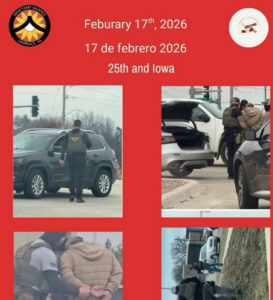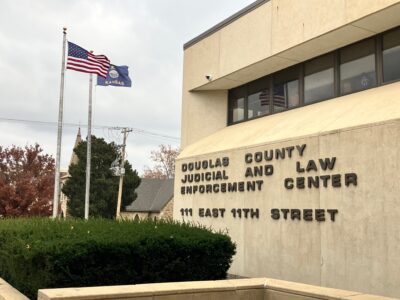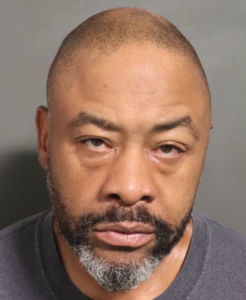‘I’m with you,’ Lawrence police chief tells trans community; ‘You can use whichever bathroom you choose’

photo by: Kim Callahan/Journal-World
Rachel Reed, in green, asks Lawrence Police Chief Rich Lockhart, center, a question at a PFLAG meeting Wednesday, June 14, 2023, at the Lawrence Public Library. Next to Lockhart, from left, are Sgt. Meagan Shipley and police IT worker Brit Crossen.
“You can use whichever bathroom you choose,” and if someone is threatening you or harassing you for that, you can call the police.
That was the message that Lawrence Police Chief Rich Lockhart delivered to Lawrence’s LGBTQ community at a PFLAG meeting Wednesday evening at the Lawrence Public Library.
That’s because SB 180 — Kansas’ new law that bars transgender people from using restrooms and other public facilities that align with their gender identity — contains no enforcement or penalty provisions.
“There’s nothing for us to enforce,” Lockhart said of the law, which goes into effect July 1.
But what happens, many in the audience asked, if and when the Legislature decides to add penalties to the law?
“What’s more important to you, your oath (to uphold the law) or the people” who are harmed by this law? Reagan Eidemiller asked Lockhart.
“The people,” Lockhart said decisively, prompting a gasp of surprise from the audience. “I’m with you.”
“I may not have a job for very long,” he added, if forced to uphold a law that he evidently feels is unjust.
The police have historically been on the wrong side of many issues in the past, he told the audience, and he does not personally intend to be on the wrong side of this issue.

photo by: Kim Callahan/Journal-World
Lawrence Police Chief Rich Lockhart spoke at a PFLAG meeting Wednesday, June 14, 2023, at the Lawrence Public Library. Next to Lockhart, from left, are Sgt. Meagan Shipley, police IT workers Brit Crossen and Isabelle Franceschi, and Detective Meghan Bardwell.
Lockhart and several Lawrence Police Department employees, including Sgt. Meagan Shipley, Brit Crossen, Isabelle Franceschi and Detective Meghan Bardwell, took questions from dozens of people, most of whom expressed fear and disbelief over the new law. Officer Allison Haddad, the department’s LGBTQ liaison, is on military leave and was unable to attend.
Among the audience’s questions: Even if trans people won’t be arrested by local police, will members of the public feel more free to further assault and harass them in public bathrooms, locker rooms and other gender-segregated spaces? And what options do they have against such dehumanizing behavior?
Shipley identified with the crowd’s concerns.
“I get told I’m in the wrong bathroom all the time. This is personal for me,” the sergeant said. “I don’t want the cops being called on me.”
Both Shipley and Lockhart told the crowd that they wanted the community to feel like they could trust the police, and they vowed to work with groups such as PFLAG to get that message across to the community — and not just vocally but in writing.
Lockhart acknowledged that it was an uphill battle to inspire that trust in law enforcement, noting that police officers attended the recent Pride Parade to support the LGBTQ community and were met with some hostility.
Some people “were upset by cops being there,” Lockhart said, acknowledging the trust issue but hoping that it can change through continued community conversations.
“We are all part of this community. We don’t want anyone to feel unsafe,” Lockhart said, inviting audience members to speak up about what they need to feel safe.
The top concern seemed to be how police would respond to calls from businesses reporting that a person was using the “wrong” bathroom.
Rachel Reed, a trans woman, said she had been using women’s restrooms for many years and had yet to encounter a serious issue but she feared that could change with the new law, which might embolden people to take matters into their own hands.
“People have been given license to harass us,” she said, just like they were given license to harass Black people by Jim Crow laws.
“It’s not about the bathrooms now, just like it wasn’t about the bathrooms then,” she said. “It’s about control” and bigotry.
If a person bothered by a trans person in the bathroom goes to the manager, “how will you treat that?” Reed asked.
Lockhart said a trans person in that situation would have nothing to fear from police, but if a complaining person were being threatening or violent, that person could be arrested for disorderly conduct, assault, battery or any other applicable crime as defined by existing statute.
“Those are all crimes already,” he said, and he encouraged people who felt threatened in that type of situation to call 911 and report the incident.
But what if the responding officer is transphobic? one person asked. Another said, “Cis het white men are a little scary to this group,” noting that most police officers fit that demographic, which Lockhart acknowledged.
“There are dangers out there all day that you have that I don’t as a cis man,” Lockhart said, but he indicated that he would not tolerate bigotry and encouraged people to report officers who mistreated them.
Shipley and Detective Bardwell doubled up on that encouragement.
Shipley told people who encounter hostility or transphobia from a responding officer to ask to speak to that officer’s sergeant and to file a complaint.
Bardwell was even more direct: “Report it. We don’t want to work with them.”
The panel also encouraged people to be “good witnesses” and to collect details that would be helpful in police investigations if they saw someone being harassed — preferably to record a hostile interaction if they felt they could safely do so.
Lockhart also reminded the crowd that Lawrence municipal ordinance contains Chapter 10, which broadly protects residents against discrimination based on gender identity and sexual orientation, and any aggrieved person is entitled to file a complaint with the city under that provision.

photo by: Kim Callahan/Journal-World
Lawrence Police Chief Rich Lockhart and other members of the police department spoke at a PFLAG meeting Wednesday, June 14, 2023, at the Lawrence Public Library.
Janis Guyot, the president of the local PFLAG chapter, and many others in the room asked Lockhart if the department would be willing to put out a statement affirming its commitment to nondiscrimination.
“Yes,” Lockhart said, “that’s something we can do,” noting that the department already has a policy of nondiscrimination but that more conversation and communication are necessary to reassure frightened people.
At the end of the meeting, he passed out his business cards: “Call me. Email me. Whatever you feel comfortable with,” he told the crowd.
Lockhart has official company in opposing the spirit of SB 180.
On Friday, Douglas County District Attorney Suzanne Valdez issued a release saying that she would not prosecute anyone under SB 180, calling the law cruel and hateful.
Also last week, Lawrence Mayor Lisa Larsen said at a PFLAG meeting that she intended to personally oppose the law “tooth and nail.”







